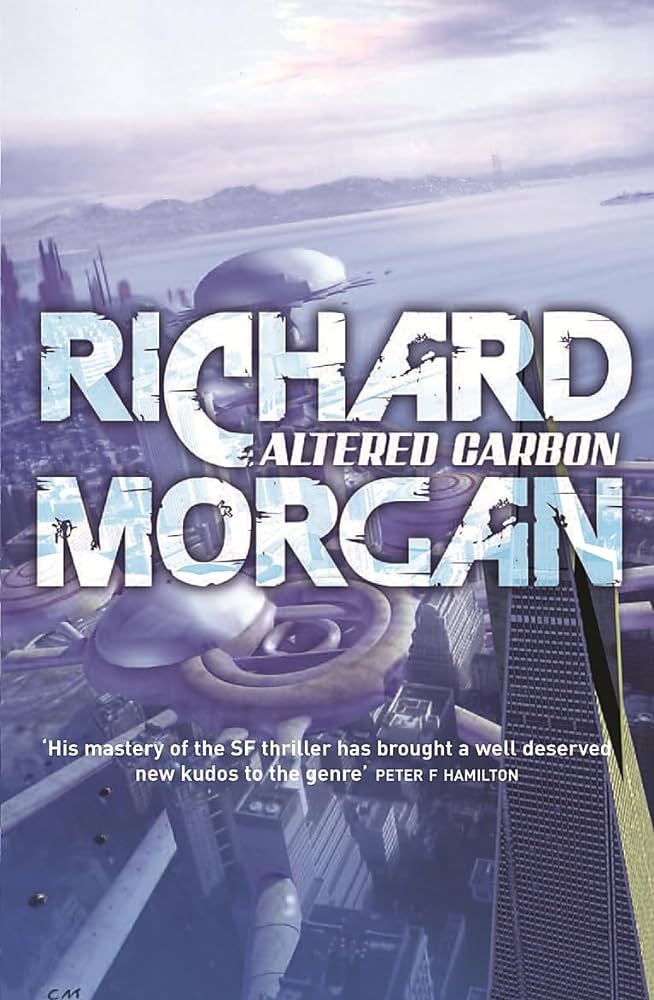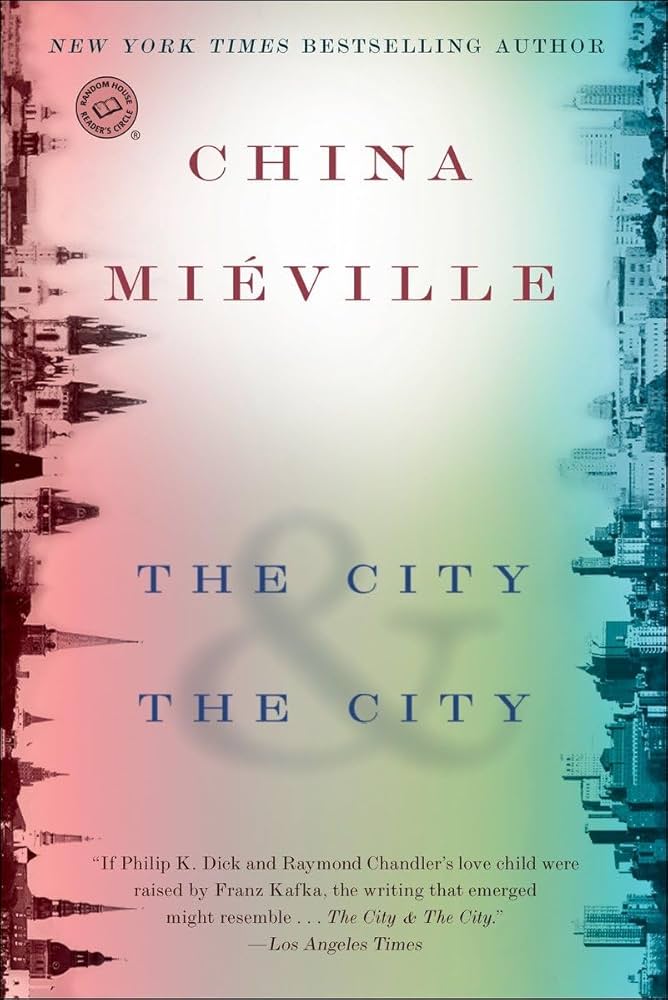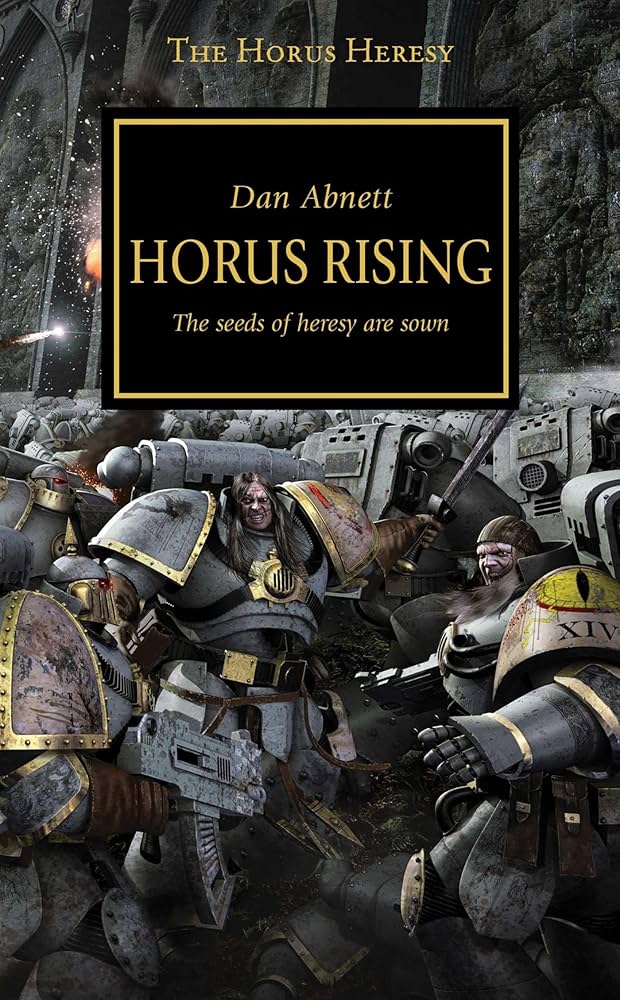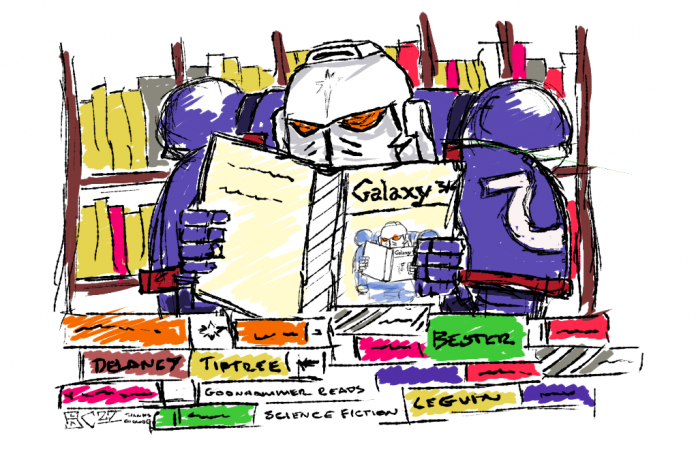If history ended when the Berlin Wall fell, it started again in early September 2001. The long nineties, with their pretence of peace and stability for Western Europe and NATO, turned out to have been simply a period of very successfully exporting violence in every sense out from the Imperial core. When it returned, we found ourselves looking out a world that had not changed, a system of mutually brutalising horrors, where science fiction dystopias of surveillance, extrajudicial murder, high-tech terrorism and the omni-state were marshalled in the defence of “freedom”. What many had thought was behind us altogether had never really gone away – as the Onion put it, our long [trans]national nightmare of peace and prosperity was behind us. Welcome back to Goonhammer Reads Science Fiction’s Long Nineties series, part three.
Early 00s Science Fiction is a bit of a weird place to navigate. It’s the decade that Young Adult novels exploded into the sci-fi scene, arguably culminating in the smash success of the Hunger Games, a fun riff on Battle Royale very much addressing post 9/11 anxieties around the future of the United States and the cemented monopoly on violence during the War on Terror. It’s also a decade in which an absolute shitload of Crusade Shovelware came out in both Historical fiction and sci-fi, a decade of shootemup/swordemup novels where pseudo-Christian heroes slugged it out amongst the stars. Warhammer, shooting into popular prominence with a combination of “turns out the future really is a grimdark, pointless crusade” and “these Lord of the Rings movies are pretty good aren’t they?”, was perfectly placed to tap into the under-then-overcurrent of religious and racial paranoia, high-tech-morally-dubious violence and military worship that pervaded the 00s.
Altered Carbon, Richard Morgan
Takeshi Kovacs was many things – an Envoy, a Criminal, an investigator, a stack of memories and experiences shunted from body to body – but what he is right now is confused. Hired to investigate a murder by the victim, he’s brought back from the colonies to old, sick, Earth, falling immediately into a web of lies, resurrections, politics and fucking that will take all his skills and lifetimes of experience to solve.

If we’re starting off with high tech violence and supersoldiers, we should really start off with the best in of the period, right? That’s here in Altered Carbon. Morgan wrote a trilogy of books about Takeshi Kovacs, soldier/terrorist/investigator, and they’re all at least quite good, but Altered Carbon is undeniably the best. It’s cyberpunk filtered through the lens of the 00s, the 80s vibe of hackers and anarchists replaced (to some extent at least) with soldiers and ideologies, set in a system perhaps on its way towards the ultra-stratified Neuromancer but still with enough flexibility to let Kovacs do his thing (violently, usually).
While it has that 00s feel to it, Altered Carbon is still cyberpunk “done right”, a messy investigation created and solved by high technology, societies warped by wealth into unrecognisably cruel forms, sex, drugs, rock and roll and a sarcastic, bitter main character thrown into the middle of it. There were many imitators and almost-likes to follow Kovacs, but for the paragon of the 21st century cyberpunk revival, Altered Carbon is what you want.
The City and the City, China Miéville
In a City, there has been a murder. In another City, someone has disappeared. Somewhere in both, there are answers, but only to those who can move between the two.

I should probably have called this article “00s murder mysteries”, because a lot of the best sci-fi of the period has that common thread running through it. I suppose that’s emblematic of the time – a great, world-spanning set of crimes committed, a knowledge of exactly who was responsible, a sense of abject powerlessness that anyone would be brought to justice. Enter sci-fi. The City and the City is a murder mystery, but it’s really about the juxtaposition, rejection, mingling and adjustments of two cultures – one slightly western, one slightly eastern, both fairly Balkan. Miéville has the fantastic concept that two places occupy a single space, with citizens of Beszel and Ul Qoma living and working together, but ruthlessly determined not to see the other.
It’s hard to think of a more 00s concept, really, the idea that parallel worlds existed on earth, each determined to be after a long period of supposed monoculture that had turned out to be a simmering pot of resentments, whether that monoculture was based in class, religion, politics or ethnicity. The “other” is right there, among you, and always has been. The other isn’t an enemy, but it’s not always a friend – people are people, whichever City they reside in. The idea is extremely cool, the execution is near perfect. Characters and places feel real enough that you wonder if Miéville has actually been to the City and the City, even though (perhaps because) its all overlaid with Miéville’s signature Cosmicomics-and-Cyberiad hallucinatory unreality.
I could write about the City and the City for quite a while, but instead of reading me writing about it, just go bloody read it. I think it’s probably one of the top 5 books I’ve ever recommended. Or will ever. It’s good.
Three Body Problem, Cixin Liu
The planet and civilisation of Trisolaris has what might be called a fantastic outreach strategy – enticing game players from across the earth to participate in a history lesson-cum-physics problem known as the Three Body Problem. To some it’s a harmless and interesting hobby, to others the final vindication of long-planned strategies around first contact. Either way, something big is coming – an economic, military, extraterrestrial and cultural revolution that could spell doom for humanity.

Aha! You’re thinking. This is a book from 2014! It is, but only in English. First published serially in 2006 in the most popular science fiction magazine of all time – China’s Science Fiction World – Three-Body Problem is very much a 00s classic. Not all adjustments to the world that emerged out of the haze of the long 90s were the same, and Three-Body Problem speaks to the issues addressing the newest world superpower, the replacement for Russia as it delved into an orgy of privateering and political realignment for a decade. What exactly is the world going to look like? What responses to forces of physical and cultural invasion will the world come up with? How does China address its own history and the legacies of the 20th century in the world-to-come?
Three-Body problem is a wonderfully interesting novel in the grand tradition of my favourite Science Fiction – take an extremely high-concept issue (how to predict the motion of three orbiting bodies) and use it to talk about how humans interact with the world. Taking in the Cultural Revolution and its consequences, the emerging Chinese internet, video games, colony ships and alien invasions, Three-Body problem is as complicated, intricate and interesting as the orbital motions that drive the main plot of the books. The Dark Forest and Deaths End are good sequels, though perhaps don’t quite match the interest and hype generated by the first novel.
Black Library Pick – Horus Rising, Dan Abnett
Horus is the foremost champion of humanity, a light in the darkness of a Galaxy emerging from the long night. Under his hand lie millions of Space Marines, untold billions of human soldiers and a war machine the likes of which will never be seen again. He is our hope, our paragon, our Warmaster.

If you’re tapping into the zeitgeist of “the world is a terrible, crushing place caught in an endless war” in the 1980s with your Warhammer-in-Space game, it makes sense that you’re going to revisit that idea when the wheels of history take us back into a forever war two decades later. With a “Golden Age” ending and a new, dark future on the horizon, GW dived fully into the idea that maybe things really were better back then with Horus Rising, the first book in a proposed short series exploring Horus and his Heresy. Just like the short little excursion the Axis of Good proposed into Iraq and Afghanistan, it turned into a bloated, 20 year explosion of violence, unleashed dark forces in the hobby, and exposed far too much of the rotting underside of the Imperium.
You know what, though? Horus Rising is pretty damn good. It’s a fun way to lift the lid on 40k in the grand style of showing everything to be completely and totally different. Meeting Abbadon the wise-cracking nice guy, Horus the kind, loving father, and the promise of the Imperium as an almost shiny golden wonderland still gives you a little thrill and for all that came after it, Horus Rising is still one of the best books the Black Library has put out.
Next time: I dunno, any ideas?
Have any questions or feedback? Drop us a note in the comments below or email us at contact@goonhammer.com. Want articles like this linked in your inbox every Monday morning? Sign up for our newsletter. And don’t forget that you can support us on Patreon for backer rewards like early video content, Administratum access, an ad-free experience on our website and more.


